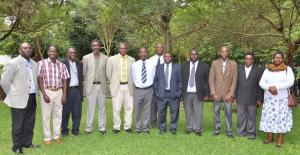WHO supports workshop on climate change vulnerability and adaptation assessment
Lusaka, 4 February 2015 -- It has been estimated that 23% of deaths or a population of 2.4 million per year is attributable to environmental risk factors, whose impact is especially felt among the poor and vulnerable (children, women and rural and people with disabilities).
About 60% of the ecosystem services are being degraded or subjected to pressure with consequences on the quality of air and water and an increase in natural disasters. Climate change is expected to affect health, agriculture, food security and water sectors.
World leaders – in particular, African Ministers of Health and Environment resolved to implement all conventions and declarations that bear on health and environment particularly the Libreville, African Health Strategy of the African Union and the Millennium Development Goals (MDGs).
Climate change is among the important factors affecting socioeconomic development in Zambia. The country is experiencing climate-induced hazards such as drought, flash floods and extreme temperature intensity. However, capacities are limited for conducting climate change vulnerability and adaptation assessment at country level. Local policies and strategies across sectors need to be harmonized for effective impact on effects of climate change.
In view of the above, the WHO Country Office supported a national workshop on climate change vulnerability assessment and adaptation in Lusaka from 23 to 27 February 2015. The vulnerability and adaptation assessment activities in Zambia have been planned to be implemented between 1 January 2015 and 30 May 2015.
The main objective of the workshop was to identify stakeholders and to define their roles in the process of vulnerability and adaptation assessment in the country.
Participants were drawn from: Ministry of Health; Ministry of Agriculture and Livestock; Ministry of Lands Natural Resources and Environmental Protection; National Food and Drug Laboratory; Disaster Management and Mitigation Unit in the Vice President’s Office; Interim Secretariat on Climate Change under Ministry of Finance; Copperbelt University- School of Medicine on the Copperbelt Province; University of Zambia, School of Medicine in Lusaka and the World Health Organization. Academic and research Institutes, UN agencies and Private Institution on GIS were also represented.
The meeting served as a forum for building consensus on the objectives and areas of focus for the vulnerability and adaptation assessment activities including the methodology, data collection, collation and analysis, advocacy and dissemination plan for the findings.
The stakeholders also identified specific areas which will be included in the exercise particularly the impact of climate change on vector-borne diseases such as malaria and sleeping sickness and the impact of climate change on water-borne diseases. In addition, the workshop identified partners and their roles and responsibilities. Findings from the planned climate change vulnerability and adaptation assessment in Zambia are expected to inform policy on national, regional and global targets.
The major recommendations for WHO from this meeting are: To facilitate data collection and analysis on the vulnerability and adaptation assessment exercise and to support an international workshop on climate change planned to take place in Ndola and a follow up stakeholder meeting between 29 March 2015 and 2 April 2015.
_________________________________
For more information:
Dr Fred Masaninga, Malaria Advisor
Email: masaningaf [at] who.int (masaningaf[at]who[dot]int)
Tel No: + 260-211-255 398 / 255 336 / 255 322
Nora Mweemba, Health Information and Promotion Officer
Email: mweemban [at] who.int (mweemban[at]who[dot]int)
Tel No: + 260-211-255 398 / 255 336 / 255 322



